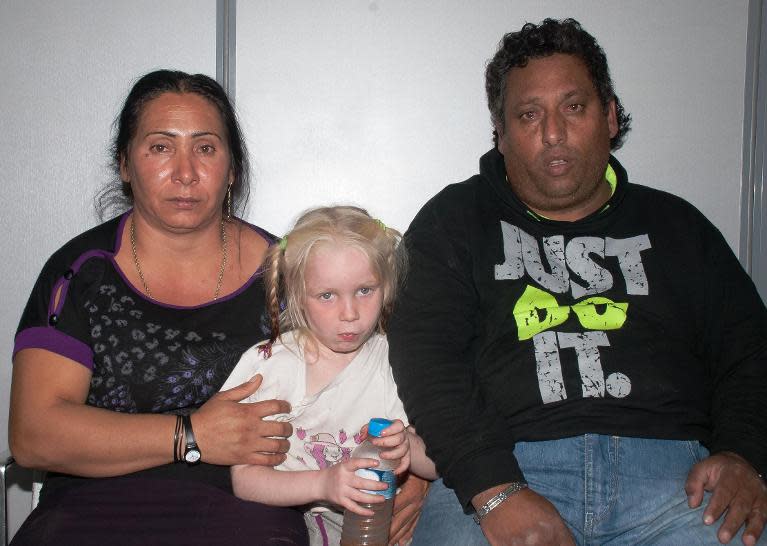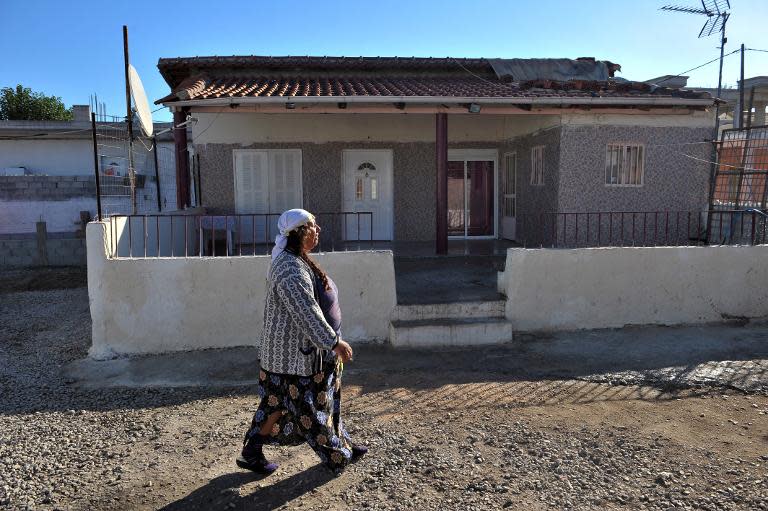Roma couple charged with abducting 'blonde angel'
A Roma couple were charged in Greece on Monday with abducting a young girl dubbed the "blonde angel", whose discovery has prompted thousands of calls from parents of missing children. The couple -- a 39-year-old man and his 40-year-old wife -- were ordered detained by a court in Larissa, central Greece on charges of abducting the child, their lawyer Konstantinos Katsavos told AFP. They face a sentence of between 10 and 20 years in prison if convicted. Police found the blonde-haired, green-eyed girl named Maria in a Roma camp in the central town of Farsala on Wednesday, and the couple was arrested after DNA tests showed they were not related. The girl's discovery has struck a powerful chord with parents of missing children around the world, including those of Briton Madeleine McCann who vanished in Portugal in May 2007. Though first described as a four-year old, dental checks suggest Maria is actually five or six, the head of the Greek charity Smile of the Child, which has been caring for her, told local media. While police believe the girl may have been abducted at birth, the couple claims she was given up by her biological mother, who they say is Bulgarian, because she could not raise her. "We're talking about a woman who could not raise this child and who gave it to the couple in 2009 through a third party shortly after her birth," a lawyer for the couple, Marietta Palavra, told AFP over the weekend. "There has been no kidnapping, no robbery, no trafficking," insisted her colleague Konstantinos Katsavos, who also represents the couple. "They did not buy the child," he said. "We know the (girl's) parents are from Bulgaria," Marios Sainopoulos, a representative for the Roma community in Greece, told Skai TV on Monday. "The mother gave the child away because she could not raise it... the child was not kidnapped," he insisted. 'It has given hope to so many parents' Illegal adoption, in some cases involving trafficked children, has flourished in Greece, where birth rates are low and official adoption procedures grueling. Intermediaries can charge 15,000-20,000 euros ($20-27,000) per child according to police data, the state-run Athens News Agency said Monday. Impoverished Roma families in Bulgaria are approached by traffickers who offer to pay 3,000 euros for a boy and 2,500 euros for a girl, the agency said. Smile of the Child say they have been inundated with calls and emails in response to international media coverage of Maria's discovery. "Until Sunday evening, we had received more than 8,000 calls and thousands of emails," charity spokesman Panagiotis Pardalis told AFP. He said the organisation's site had received more than 200,000 visits and its Facebook page about half a million. "It is either families (of missing children) or even unrelated persons (who contact us from abroad), sending us photographs and other information. We forward all the information to the police," he said. "We even have calls from Japan and South Africa now," Stefanos Alevizos, a psychologist for the organisation, told Skai TV. "This case has caused a huge international interest. It has brought to the surface the subject of child trafficking and has given hope to so many parents whose children are missing," Pardalis said. The family of Ben Needham, who disappeared from the Greek island of Kos in 1991 aged 21 months, welcomed news of the little girl's discovery. "We have always believed that Ben's abduction was gypsy-related and have had a long ongoing inquiry in Larissa (near the camp where Maria was found). We hope that the investigation into Ben's disappearance will now be looked at again," Ben's mother Kerry Needham told ITV. Greek authorities are working with Interpol to trace Maria's biological parents in a Europe-wide search, according to a police source. The Athens News Agency reported Sunday that police were investigating hospitals and childcare agencies for possible child trafficking, suspecting a ring operating between Bulgaria and Greece. "The police are investigating every possible angle," a spokeswoman at the local Larissa police station told AFP. In January 2011, police arrested more than a dozen people in the two neighbouring Balkan countries, for the trafficking of newborn babies to Greece. In that case it was Roma babies who were being trafficked. The ring arranged for pregnant Bulgarian women, primarily of Roma origin, to give birth in Greece with their infants then sold off in illegal adoption procedures.



